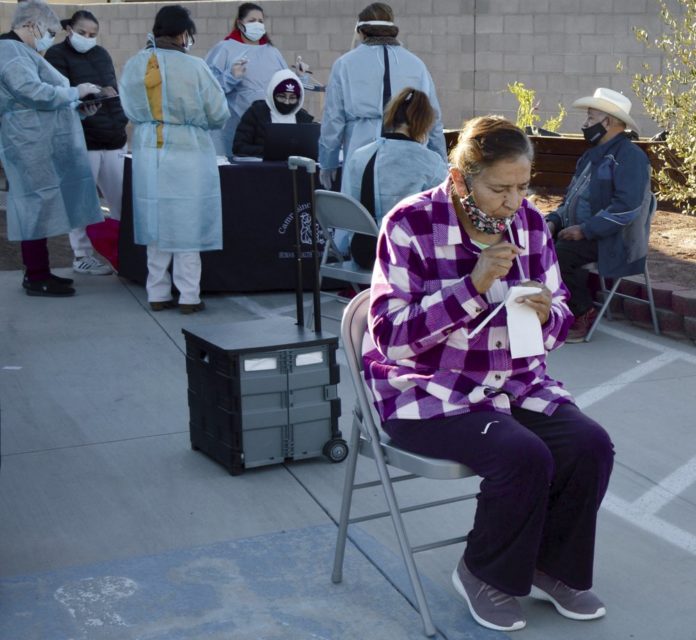
Exhausted nurses in rural Yuma, Arizona, regularly send COVID-19 patients on a long helicopter ride to Phoenix when they don’t have enough staff. The so-called winter lettuce capital of the U.S. also has lagged on coronavirus testing in heavily Hispanic neighborhoods and just ran out of vaccines.
But some support is coming from military nurses and a new wave of free tests for farm workers and the elderly in Yuma County — the hardest-hit county in one of the hardest-hit states.
Almost everyone in Yuma County, near the borders of Mexico and California, seems to know somebody who has tested positive for COVID-19, with around 33,000 cases reported since last spring — a rate of about 14,000 per 100,000 people. Maricopa County, the largest in Arizona and home to Phoenix, has a rate of about 9,000 cases per 100,000 people.
Yuma County’s soaring numbers come as Arizona’s COVID-19 diagnosis rate ranked the worst in the U.S. over the past week, at one in every 120 people.
“It’s had a significant impact on the community,” said Dr. Robert Trenschel, president and CEO of Yuma Regional Medical Center, the area’s only acute care hospital. “We’re still likely to see another peak from New Year’s celebrations.”
Tests in Yuma County are 20% positive, compared with about 14% for Arizona. The Arizona State Department of Health Services reported Sunday that 633 people had died in the county with a population of about 215,000
Of the 124 COVID-19 patients hospitalized as of Friday, 28 were in intensive care, according to local health statistics.
Officials at Yuma Regional Medical Center say it’s been a struggle to maintain staffing of 900 to 1,000 nurses while competing for medical workers in an overwhelmed national health care system.
To ensure each nurse has no more than five or six patients at a time, the 406-bed Yuma hospital has transferred COVID-19 patients to other facilities, sometimes up to 10 a day, said Deb Anders, chief nursing officer. Transfers are usually by helicopter to Phoenix, which is 180 miles (290 kilometers) away and has the closest major hospitals, although a few have gone to Tucson in southern Arizona.
Forty Army Reserve nurses arrived this month to help at the Yuma hospital for at least a month through a Department of Defense COVID-19 support operation in hard-hit parts of the U.S. West and Midwest.
They are among several hundred military medical personnel dispatched since November to work alongside civilian health care providers treating COVID-19 patients on the Navajo Nation and in six states including Arizona and New Mexico, according to the U.S. Army North at Fort Sam Houston in Texas.
Yuma County’s residents include seasonal laborers from California’s Salinas Valley and Mexican migrant workers with U.S. agricultural visas.
The hot, dry region features vast agricultural fields of leafy greens, alfalfa, and cotton in the middle of the desert, fed by the Colorado River that meanders near Yuma’s historic downtown.
Top non-farm employers include the medical center, the Marine Corps Air Station Yuma, and the U.S. Border Patrol. The county is also home to some 85,000 part-time retirees and thousands of inmates at the Yuma State Prison Complex.
At the U.S.-Mexico border, farmworkers headed to the fields Thursday were getting hundreds of free saliva tests engineered by the Arizona State University’s Biodesign Institute through a $4.7 million grant from the National Institutes of Health. The initiative aims to improve testing in places like Yuma County, which is 60% Hispanic and thus disproportionately affected by the virus because of conditions like diabetes and obesity.
Working with bilingual health advocates from the Yuma area, the Equality Health Foundation administered tests through the project Friday to older people and those with disabilities at their homes.
“Yuma is a testing desert,” said Tomas Leon, spokesman for Equality Health, which brings medical care to underserved communities. “We are taking these tests in a community-driven, culturally appropriate way to people where they are.”
Flavio F. Marsiglia, director of ASU’s Global Center for Applied Health Research, said he and others involved in the testing project are now exploring the possibility of returning to Yuma County with the vaccine later this year.
“We are trying to get to these hard-to-reach parts of society that are always left behind,” Marsiglia said.
The Yuma County Public Health District reported in the middle of last week that its early supply of the vaccine had run out. Arizona officials say that some 6,200 doses have been administered in Yuma County.
“Vaccines are really what we need right now,” said Trenschel, the medical center’s CEO. Much of the hospital’s staff has received the first of two recommended doses.
The vaccine rollout in Yuma has been slow, with the county saying over the weekend it was getting get just 6,900 more doses Tuesday.
In Yuma County’s small border city of San Luis, Mayor Gerardo Sanchez, who is also a physician’s assistant, uses his Facebook page to advertise free testing like Equality Health’s and encourage people to wear masks.
Yuma Mayor Douglas Nicholls, meanwhile, promotes a city program that collects donations for meals and other tokens of appreciation for front-line medical staff.
Children also send thank you cards to health care workers.
“The messages really warm my heart,” said certified pharmacy technician Jenny Jimenez, who received a stack of cards as she worked one recent overnight shift.
“Dear healthcare workers,” a little girl named Catherine wrote alongside a hand-drawn heart in a card for doctors in the COVID-19 unit. “Thank you for keeping us safe from COVID. We appreciate everything you do.”
Republished with the permission of the Associated Press.














